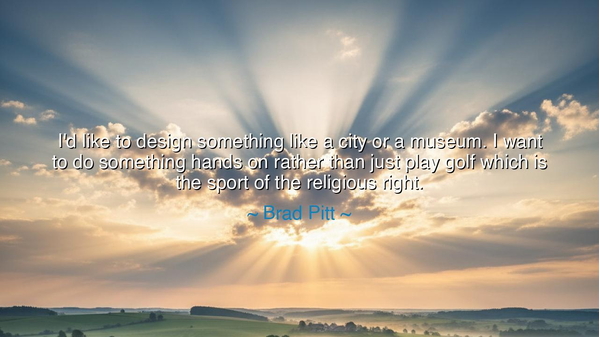
I'd like to design something like a city or a museum. I want to
I'd like to design something like a city or a museum. I want to do something hands on rather than just play golf which is the sport of the religious right.






“I'd like to design something like a city or a museum. I want to do something hands on rather than just play golf, which is the sport of the religious right,” spoke Brad Pitt, not merely as an actor or celebrity, but as a restless seeker—one who longs to shape the world with his own hands. Beneath the humor of his remark lies a profound yearning for purpose, for the act of creation that transcends comfort and idleness. His words echo the timeless truth: that to build, to design, to shape the world is to fulfill one’s duty to life itself.
In this quote, Pitt reveals the spirit of the maker, the eternal craftsman who cannot be content with leisure alone. For the human soul, when untested, grows weary not from labor but from emptiness. The sport of idleness—whatever form it takes—may delight the body, but it cannot feed the heart. Pitt’s desire to design a city or a museum is not a mere dream of architecture; it is a metaphor for the deeper calling within all who wish to leave behind more than footprints in the sand. He wishes to shape civilization, to bring order, beauty, and meaning into being.
The ancients understood this yearning well. When the philosopher Plato wrote of the ideal city in The Republic, he was not speaking of stone and streets, but of a living harmony between design and morality, between architecture and the soul. Likewise, when the sculptor Phidias carved the statue of Zeus or when Michelangelo labored over the dome of St. Peter’s Basilica, their work was not born of idleness but of reverence—a desire to unite heaven and earth through creation. Each stone they placed, each line they drew, was a prayer to existence itself. So too, Brad Pitt’s yearning to create reflects this ancient impulse to build something lasting, something that outlives the self.
Pitt’s words also challenge the modern spirit of distraction, the quiet decay that comes when men and women turn from building to mere consumption. To “play golf,” in his symbolic phrasing, is to accept comfort as destiny, to confuse leisure with living. He rejects that illusion. For he understands that to be alive is to engage, to take part in the sacred struggle of shaping one’s surroundings and one’s self. Creation—whether of a city, a family, a work of art, or a community—is the act by which humanity becomes divine. Leisure, without purpose, is but a slow surrender to nothingness.
And yet, there is humility in his words. He does not dream of ruling a city, but of designing one—of working with his own hands, of sweating with craftsmen, of bending metal and stone to human will. In this, he honors the tradition of the artisan, the builder who learns through struggle, who molds raw material into form. There is no arrogance in creation, only discipline. For as the ancients taught, the hands that build must also listen—to nature, to reason, to the rhythm of the world. To design is not to dominate, but to collaborate with the essence of things.
This truth finds reflection in history’s greatest rebirths. When Florence rose from the ashes of plague and despair, it was not through politics or conquest, but through the hands of creators—architects like Brunelleschi, who raised cathedrals to the skies, and artists who gave soul to stone. They rebuilt not only their city, but their spirit. They proved that to build is to heal, and to design is to resurrect. Pitt’s longing follows in that same lineage—the understanding that art and architecture are not luxuries, but acts of salvation.
Thus, the lesson of his words reaches beyond art or fame. It is a call to all who drift in comfort, who have forgotten the joy of creation. Seek to build, not merely to consume. Engage your hands, your mind, your will. Design something that did not exist before you came—a garden, a home, a community, an idea. The world does not need more spectators; it needs builders of meaning.
For in the end, the soul does not find peace in leisure, but in creation. The ancients knew it, and Brad Pitt reminds us still: that to shape the world, even in small ways, is to honor the divine within. The measure of a life is not how much rest it takes, but how deeply it has dared to build. So go forth—not to escape work, but to embrace it. For to create is to live twice: once in the doing, and again in what remains.






AAdministratorAdministrator
Welcome, honored guests. Please leave a comment, we will respond soon